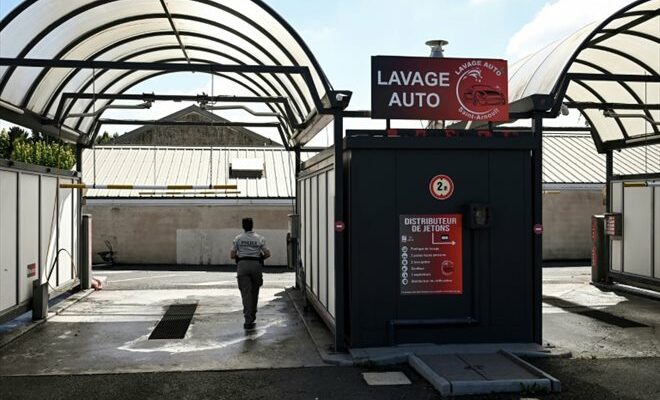Car wash station in Saint-Quentin-en-Yvelines (Yvelines) on August 5, 2022 (AFP/Archives/ALAIN JOCARD)
Car wash stations, closed for several weeks due to lack of water in 2022, fear being sentenced again this summer and are trying to defend what they see as their “ecological” role.
Nearly 90% of the 14,000 French washing points were closed for several weeks at least in the summer of 2022, according to their organization, Mobilians. Alongside large service stations and hypermarkets, small pump attendants and car wash centers are suffering from prolonged closures.
“I lost 85% of my turnover in the summer period”, explains Laurent Gillio who operates three resorts in the Var. In times of drought, they were first barred with tape by the gendarmerie, before being reserved for ambulances, doctors or firefighters.
And the first washing bans for 2023 could fall soon, after a very dry winter: the prefects were summoned to the Ministry of Ecological Transition on Monday.
– Prohibited at home –
Car washers see themselves as scapegoats and struggle to make themselves heard.
The washing sector only weighs “one billion euros” in turnover and represents “a very good vector of communication” for the government, suggests Yves Brouchet, general manager of Elephant Blue, the second national network behind TotalEnergies.
Car washing represents 0.2% of drinking water consumption in France. He wants to defend his place, beyond the amateurs of nickel bodywork.
Blue Elephant tried to make journalists aware of this during 2022 by sending them a bottle of (fake) polluted sludge.
In one wash, 360 grams of sludge would thus be recovered, including a large part of sand and earth, but also 75 grams of hydrocarbons (fuels, oils), and 0.7 grams of heavy metals (copper, lead, nickel) related to the deterioration of rolling parts (brakes, tires, engine) and concentrated mainly around the wheels.
Dirty water loaded with sludge and soaps is first summarily filtered in tanks under the station. The rest is sent to a sewage treatment plant. “These are materials that would all go down the drain or into nature,” explains Yves Bruchet.
A high-pressure jet wash uses 60 litres, slightly less than a shower, according to Mobilians. 120 liters are needed in the tunnel and 160 under a portico, the equivalent of a bath.
At home, in the absence of high pressure, this same washing requires 360 liters, according to the same source. Washing with water in front of your home or in your garden is also prohibited, but the measure is little known and offenders rarely punished.
However, 38% of motorists washed their car at home in 2019, according to an OpinionWay survey for Blue Elephant. 52% went to a car wash approximately once a month. And 10% said they never wash their vehicle.
Others prefer dry cleaning, with rags soaked in detergent that will also have to be washed with plenty of water.
– Towards recycling –
To anticipate problems this summer, the Ministry of Ecological Transition intends to develop water recycling. A strong incentive is already in force: only stations equipped with suitable devices can remain open during periods of drought. But only 2% of them are equipped.
“It represents investments but it would allow those who recycle not to be closed,” the ministry told AFP.
TotalEnergies has already equipped 100 sites and plans to invest 50 million euros over the next 5 years to equip the remaining 1,000 centers.
Yves Bruchet estimates for his part that it would take more than 1.2 billion euros for all stations in France to recycle and that it would be better to install recycling downstream, at the outlet of the treatment plant.
“It’s the consumer who will pay” with more expensive washes, warns the boss of Blue Elephant, at the risk of pushing motorists to wash at home. Above all, he recommends the establishment of a label rewarding virtuous resorts, which control their consumption.
We should also look at the side of rainwater, underlines the entrepreneur Cédric Fontaine, who installs recovery systems on hypermarkets, in particular. “The idea is that the stations run in a closed circuit,” explains Mr. Fontaine. “It is they who consume water, it is up to them to recycle it”.
In the Var, Laurent Gillio points the finger at the swimming pools of the region. “I understand that things change, but it must be a collective effort (…) Give us standards, do the same everywhere and we will adapt. But closing us completely is a waste”.
© 2023 AFP
Did you like this article ? Share it with your friends with the buttons below.




